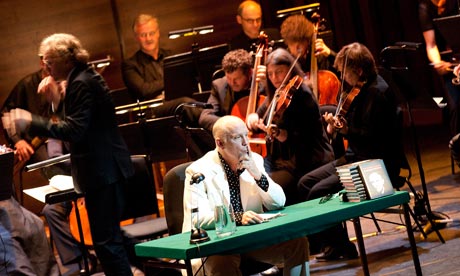Written for John Malkovich, two sopranos, a baroque orchestra, and its conductor, Michael Sturminger's The Infernal Comedy is a disquieting music theatre piece about Jack Unterweger, an Austrian serial killer and writer, who committed suicide in 1994 on the day he was sentenced to life imprisonment for the second time.
Sentenced to life for strangling a prostitute in 1974, he turned to writing in prison - so successfully that the Austrian intelligentsia campaigned for his release after serving a minimum 15-year term, to which the authorities agreed, believing him rehabilitated.
Subsequently he killed at least another nine women, both in Europe and the US - all thewhile reporting as a journalist on his own crimes - before his final arrest in Florida.
Malkovich and writer-director Sturminger bring him back to life in order to expose his guile to our prurience. His ostensible purpose is to sell us a book, written beyond the grave, which he claims is a factual account of his life and crimes. In reality, what he has come to do is peddle deceit. "I've never been able to tell the truth," he tells us at the outset. By the end, we have been confronted with both the lethal charm with which he attracted women, and the unspeakable acts he inflicted upon his victims. But the truth about his motivation eludes us as it eludes him.
It's a tour de force for Malkovich in many ways. We gradually become aware that the sudden Teutonic thickening of his sing-song Austro-American accent prefaces a hideous spillage of past trauma into present violence. He saunters among the audience trading sexual indiscretions before announcing to us that "some women just want to fuck a murderer". The humour he displays at the start has become nauseating by the close.
Interwoven into his monologue, and shared between sopranos Marie Arnet and Bernarda Bobro, are a sequence of concert arias by Mozart, Beethoven, Haydn and Weber – music which, though composed by men, depicts both female vulnerability and extremes of desire, rage, and despair.
It is here, however, that the problems start. The musical performances are variable to begin with: Bobro is a finer singer than Arnet; there's some insightful conducting from Martin Haselbock, though the orchestra, the Wiener Akademie, is good but not great.
More detrimental perhaps is the symbolic weight with which Sturminger saddles both music and singers. On one level they stand for the "genuine art" which Unterweger acknowledges as exposing his own literary fraudulence. The sopranos, however, gradually become confusedly identified with the women in his life – the mother who abandoned him, the girlfriends who refused to believe in his guilt, and the prostitutes who became his victims. The resulting sense of overload weakens the tension and focus of what is otherwise an often disturbing and compelling evening.














